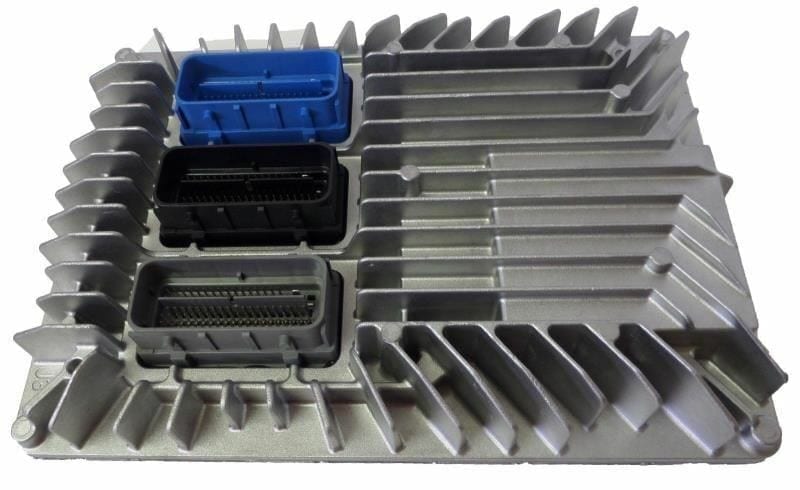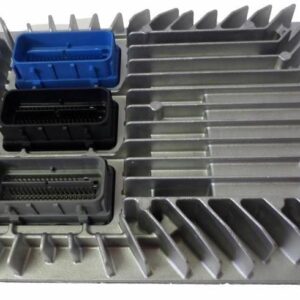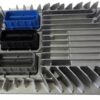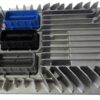Restore Peak Performance to Your GM Vehicle
Is your Buick, Cadillac, or Chevy plagued by a persistent Check Engine Light, rough idling, or a frustrating no-start condition? As a technician with over two decades of diagnostic experience, I’ve seen countless drivers chase symptoms when the real culprit is a failing Engine Control Module (ECM). This isn’t just a part; it’s the brain of your engine, and when it falters, the entire vehicle suffers. This replacement ECM, part number 12630908, is the definitive solution to get your vehicle running reliably again.
We take the guesswork and dealership hassle out of the equation. Before this module ships, we flash it with the latest GM-certified software, precisely matched to your vehicle’s VIN. This means no expensive programming appointments or special tools are required on your end. It arrives ready to install, restoring factory-specified fuel delivery, ignition timing, and transmission shifting for a smoother, more efficient ride. This is the professional-grade fix you can perform right in your own driveway.
Is Your Vehicle Showing These Symptoms?
A faulty ECM can manifest in numerous ways, often mimicking other sensor failures. If you’re experiencing any of the following, a failing computer is a likely cause. I’ve frequently traced these issues back to an internal ECM fault, especially codes like P0601 or P0606.
- ✔ Check Engine Light is on with no clear cause
- ✔ Engine cranks but refuses to start
- ✔ Unexplained drop in fuel economy
- ✔ Rough or erratic engine idling
- ✔ Vehicle stalling intermittently while driving
- ✔ Communication error codes (e.g., U0100)
- ✔ Internal module memory error codes (e.g., P0601, P0606)
From the Diagnostic Bay: The Intermittent Stall Case
I once had a 2011 Equinox in the shop that was driving its owner crazy. It would stall randomly at red lights, but only when the engine was fully warmed up. No codes were stored. We checked fuel pressure, the throttle body, and crank sensor signals—all perfect. On a hunch, I monitored the ECM’s internal temperature data. Just before a stall, the temperature reading would spike erratically. The ECM’s processor was failing under heat soak. We installed a VIN-programmed module just like this one, and the problem was solved instantly. It’s a classic example of how a failing computer can create phantom issues that are impossible to trace elsewhere.
A Straightforward Guide to Installation
Replacing your 2010 Allure Engine Control Module is a manageable job for a confident DIYer. While the exact location varies by model (see fitment list), the process is generally similar. Always consult a repair manual for your specific vehicle.
- Safety First: Disconnect the negative terminal from your vehicle’s battery and secure it away from the post to prevent accidental contact.
- Locate the ECM: On many of these models, it’s found in the engine compartment, often on the driver’s side near the fuse box or attached to the air cleaner assembly.
- Disconnect Connectors: Carefully release the locking tabs on the wiring harness connectors and pull them straight out from the module. Never force them. Inspect the pins for any corrosion.
- Remove the Old Module: Unbolt the old ECM from its mounting bracket. Keep the hardware, as you may need to reuse it.
- Install the New ECM: Mount your new, pre-programmed module in place and securely tighten the bolts.
- Reconnect Everything: Plug the wiring harnesses back into the new ECM until they click, ensuring they are fully seated. Reconnect the negative battery terminal.
- Perform Security Relearn: In many GM vehicles, a simple security relearn procedure is necessary. Typically, this involves turning the key to the ‘ON’ position for 10-15 minutes, then off, and repeating two more times before starting the engine. This allows the new ECM to sync with your vehicle’s anti-theft system.
Verified Vehicle Compatibility
This module is a direct replacement for multiple part numbers, ensuring broad compatibility across the GM family. Please verify your vehicle and original part number below. Providing your VIN at checkout guarantees we send you a perfectly matched and updated unit.
Replaces Part Numbers: 12616889, 12630908, 12637106, 12642665, 12650256, 12651993
- Buick Allure (2010): 2.4L & 3.0L
- Buick LaCrosse (2010-2011): 2.4L & 3.0L
- Buick Regal (2011)
- Cadillac CTS (2010-2012): 3.0L & 3.6L
- Cadillac SRX (2010-2011): 3.0L
- Chevrolet Camaro (2012): 3.6L
- Chevrolet Captiva Sport (2012)
- Chevrolet Equinox (2010-2011)
- Chevrolet Impala (2012)
- Chevrolet Orlando (2012-2013)
- GMC Terrain (2010-2011)
- Saab 9-5 (2010-2011): 2.0L
Do I need to do anything after installing this ECM?
Do I need to do anything after installing this ECM?
Because we program the module to your VIN, the main software is ready to go. However, on most compatible GM vehicles, you will need to perform a simple security relearn procedure (often called a Passlock or Passkey relearn). This typically takes about 30 minutes and involves cycling the ignition key. Instructions are widely available online for your specific model.
Is this a plug-and-play part?
Yes, this is as close to plug-and-play as it gets. The critical VIN-specific programming is done by us before shipping. The only additional step you may need is the security relearn, which requires no special tools.
How do I provide my VIN?
After you complete your purchase, you will need to send us your 17-digit Vehicle Identification Number (VIN). You can typically add it as a note during checkout or reply to your order confirmation email. We cannot program and ship the module without it.
Will this fix my specific problem?
This module will fix issues directly caused by a faulty ECM. While the symptoms listed are common indicators, we always recommend a proper diagnosis by a qualified mechanic to confirm the ECM is the point of failure before ordering. This part is a reliable fix for a confirmed bad 2010 Allure Engine Control Module.
What if my original part number isn’t listed?
The part numbers provided (12616889, 12630908, etc.) are the most common interchanges. If your number is different, please contact us with your VIN and original part number. We can verify compatibility to ensure you get the correct part for your vehicle.



